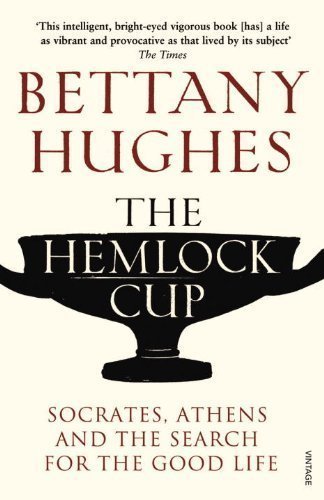Review

| Rating: | |
|---|---|
| Title: | |
| Author: | Anonymous |
| Audience: | High School |
| Difficulty: | Easy |
| Published: | 1970 |
Bettany Hughes explores the elusive figure of Socrates through the world he inhabited. In so doing she creates a vivid picture of fifth century Athens - the good and the bad - and turns Socrates into a martyr for the modern world.
Bettany Hughes has a real flare for description. In reconstructing the life of one of the world's most elusive figures, she creates an image of Socrates' world that's so evocative you can almost touch it. Starting with the day of Socrates' trial in 399 BCE, Hughes takes us back through his childhood, early years in the high society of Pericles' symposiums and the passionate relationship with Alcibiades that has so captured the imaginations of generations. With him we witness Athens' Golden Age, the birth of her empire and its descent into the infamous Peloponnesian War. This is an interpretation of Athens that both glories in its magnificence but also isn't afraid to look its more distasteful side in the face. One thing is absolutely clear – finding the 'Good Life' in this turbulent, exciting world was no mean feat.
Early on, Hughes points out that Socrates doesn't have any writings we can consult. His was oral philosophy and it is only through the writings of his followers that we are able to get any information about him at all. Thus, Bettany Hughes is looking at “the shape around the Socrates-sized hole” and creating “a topography of the man in his times”. The result is a narrative of Athens viewed from a wry, ironic perspective – Socrates' perspective. The book is divided into eight acts (a bit long for a play, but it's a nice nod to another legacy of Greek culture), looking at Athens at different phases of the philosopher's life. Act One looks at the world Socrates arrived into – a new democracy, hopeful, confident but also scarred by war with Persia and deeply religious. Act Two moves on to Socrates as a young man, hearing great thinkers in the agora and potentially the intellectual melting-pot of Pericles' dining room. At this time, Athens is going from strength to strength. Hughes' description of the Pan-Athenaea, a festival showing off Athens' greatness to outsiders, gives the impression of a city teeming with people. The ruckus of chatter, the smells, the colours must have been intoxicating. This is the Golden Age of Athens and Hughes' prose truly makes it shine.
With Act Three, however, we are introduced to the darker side of this world as Socrates goes to war. The Peloponnesian War with Sparta takes over most of this book, as you might expect considering its scale and longevity. Socrates' part in the campaign to Potidaea gives us an early taste of the bitterness of the conflict. Images of the inhabitants of Potidea starving, turning to cannibalism to survive, and the grisly trophies erected by Athenian soldiers of dead men's armour, are likely to stay with you. Good then that Hughes gives us the image of Socrates standing in his bare feet in the middle of winter and cuddling up close to the golden Alcibiades in their tent to take the edge off. The sense of Socrates being somehow a man apart develops over the next few Acts. While his fellow Athenians vote repeatedly for atrocities, Socrates declines to take part in the democratic process, wanders the streets continuing his endless questioning, watches the young men in the gymnasium and attends symposiums to discuss abstracts concepts like love. He is described as infuriating and possessing a clearness of sight that cuts through men's fabricated identities to the soft flesh underneath. He wanted Athenians to live good lives, not glorious or rich ones, and this, Hughes argues, set him fatally at odds with his compatriots.
The final act looks at Socrates' trial in depth and his eventual execution by hemlock. By this stage, Hughes gives you a real sense of the mob-style rule that Athens' democracy seems to have become. Whereas Socrates is stubbornly individual to the end, Athens is a place ruled by mass hysteria that can be easily persuaded to evil deeds. From this perspective, Hughes implies that the cause of the war was the collective over-confidence of the Athenian state. She is sympathetic to Pericles and his partner, Aspasia – who were blamed for the war in antiquity – pointing out instead the fickleness of a democracy where those making a mistake in office could find themselves ostracised or fined. She explores the contradictions of democracy with the Athenian's love of hero-like figures, such as Alcibiades, inflating young men's egos only to cut down the tallest corn.
In this landscape, Socrates' trial feels like the last bite of a dying snake – spiteful, pointless. Athens at this point is a shadow of her former self. She turns on Socrates, eager for a victim to exert power over. The triumph of the story, however, is that Socrates refuses to play her game. He mocks his trial and refuses, even with death hanging over him, to be intimidated or diverted from his beliefs. Hughes makes a good case for Socrates the martyr – a hero for our modern individualist age.
About the Reviewer
Cite This Work
APA Style
Sahu, J. (2016, July 18). The Hemlock Cup: Socrates, Athens and the Search for the Good Life by Hughes, Bettany (2011) Paperback. World History Encyclopedia. Retrieved from https://www.worldhistory.org/review/143/the-hemlock-cup-socrates-athens-and-the-search-for/
Chicago Style
Sahu, Jasmine. "The Hemlock Cup: Socrates, Athens and the Search for the Good Life by Hughes, Bettany (2011) Paperback." World History Encyclopedia. Last modified July 18, 2016. https://www.worldhistory.org/review/143/the-hemlock-cup-socrates-athens-and-the-search-for/.
MLA Style
Sahu, Jasmine. "The Hemlock Cup: Socrates, Athens and the Search for the Good Life by Hughes, Bettany (2011) Paperback." World History Encyclopedia. World History Encyclopedia, 18 Jul 2016, https://www.worldhistory.org/review/143/the-hemlock-cup-socrates-athens-and-the-search-for/. Web. 28 Jun 2025.




